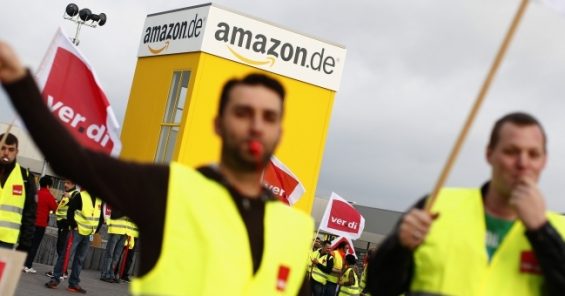Under the GDPR, Amazon workers demand data transparency
14.03.22
Amazon warehouse workers from Germany, UK, Italy, Poland and Slovakia filed access requests under Article 15 GDPR on Monday to find out how the tech giant treats workers’ personal data under the EU’s General Data Protection Regulation (GDPR). The workers have been supported by UNI Global Union, the international federation of service unions and privacy NGO “noyb.eu.”
“Amazon may be one of the largest corporations in the world but they cannot use our data to feed an algorithm, then start firing people right and left or doing whatever they want with our data. As workers, we have a right to privacy and we have the right to know,” said Andreas Gangl a shop steward for the German union ver.di and one of the workers filing the requests.
Workers are so far left in the dark about the use of their data, despite Amazon using sophisticated systems to monitor workflows. Amazon has one month to respond and fully disclose their processing of workers personal data.
“The combination of Amazon’s voracious appetite for data alongside its anti-union behavior is deeply troubling,” said Christy Hoffman, General Secretary of UNI Global Union. “This is a company that we know has spied on employees, and workers have the right to know if video and audio recordings; social network information; trade union membership status or any other data collected by Amazon is being used against them in violation of EU privacy laws.”
Amazon spying on workers. Internal documents from national unions confirm that Amazon carries out certain monitoring of its workers. For instance, it is clear that the company conducts background checks on workers and constantly monitors their work performance through a variety of invasive tools.
Workers are left in the dark. What happens with the data? Workers receive little to no information about the intensive tracking that shapes their reality in the Amazon Warehouse day in and out. They do not know what kind of information is collected, for what purposes and who it is shared with. Workers are not aware if a privacy policy exists, let alone if any form of automated decision about their future in the warehouse is being made based on tracking data.
GDPR to shed light on data processing. Under Article 13 and 14 GDPR, any EU citizen has the right to be informed about the processing of their personal data. In a united approach, Amazon warehouse workers from five European countries now filed access requests to clarify whether the company uses workers’ data to foster inhumane working conditions and unsafe productivity rates.
“This is a classic case of information and control asymmetry. On one side, we have a private company, collecting massive amounts of personal data and on the other side, we have individuals, caught in the current and economically dependent on their jobs. We are trying to lift this imbalance through coordinated access requests. – Stefano Rossetti – data protection lawyer at noyb.eu
Amazon has a history of neglecting workers rights. According to The Amazon Panopticon — UNI Global Union’s report on the intrusive and all-encompassing Amazon worker surveillance systems—Amazon’s highly invasive, and ultrafast delivery process is hiding harmful effects on its 1.3 million workers. Employees are relentlessly monitored, evaluated, and subjected to high-pressure and gruelling conditions. This model is so inhumane that as the New York Times recently reported, “Amazon burns through workers so quickly that Executives are worried they’ll run out of people to employ.” Bloomberg News also reported that Amazon drivers have been “fired by the app” for minor mishaps that a real manager would have ignored.
UNI Global Union has long been an advocate of ethical data collection and algorithmic management. In 2017, the global union issued principles to govern workplace data and has launched an initiative to curb abuses of management by algorithms through collective bargaining. Representing more than 20 million workers in 150 countries, UNI Global Union is driven by the responsibility to ensure skills and service jobs are decent jobs and that workers’ rights are protected, including the right of union representation and collective bargaining.
noyb.eu – European Centre for Digital Rights. The non-profit association noyb.eu is committed to the legal enforcement of European data protection laws. So far, noyb has filed more than 600 cases against numerous intentional infringements – including companies such as Google, Apple, Facebook and Amazon. More than 4,600 supporting members fund the work of noyb.eu.


